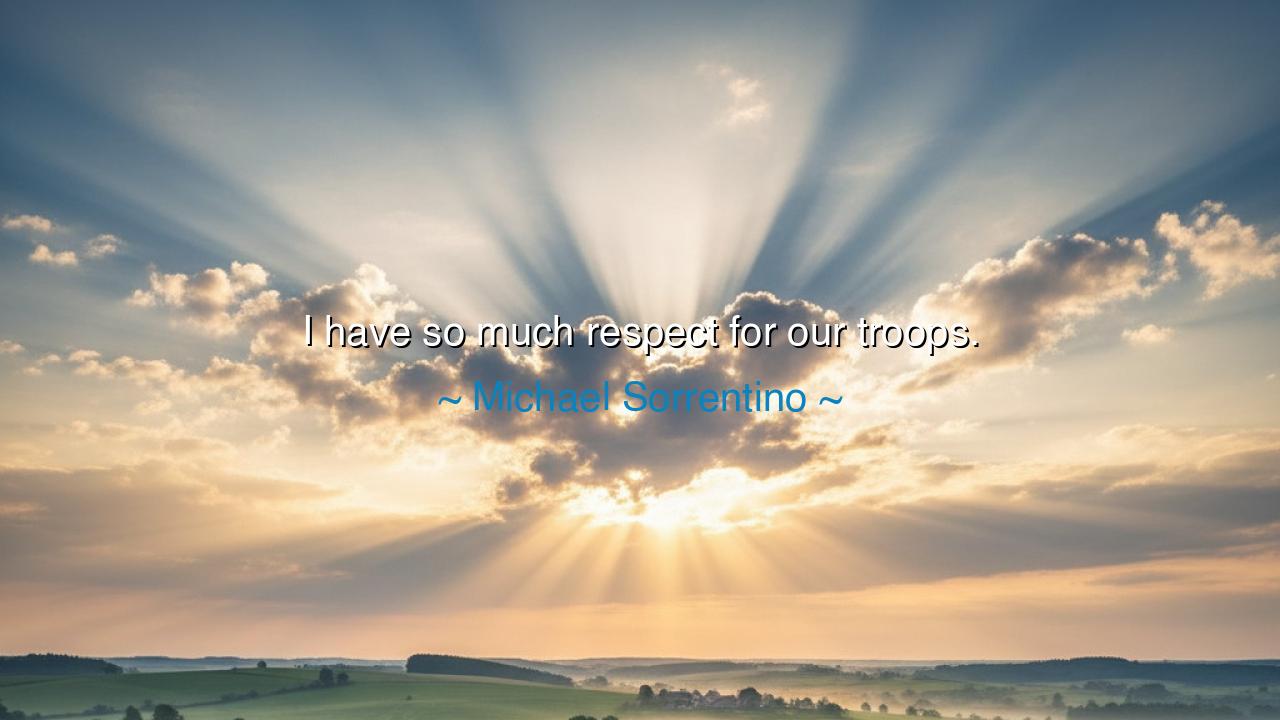
I have so much respect for our troops.






When Michael Sorrentino declared, “I have so much respect for our troops,” his words, though simple, carry the weight of centuries. They are not merely the sentiment of one man, but the echo of a timeless truth: that those who bear the burden of defense, who stand watch while others sleep, who place their lives between danger and the innocent, are owed the highest honor. His statement is short as a spark, yet it ignites a flame of reverence, for it calls us to remember that peace is never free and that every generation rests upon the sacrifice of its guardians.
The origin of such respect is older than nations, older than kings. From the walls of Troy to the battlefields of Thermopylae, from the legions of Rome to the stormed beaches of Normandy, societies have always looked to their troops as both shield and sword. They are the flesh and blood embodiment of loyalty and courage, those who take upon themselves the dangers others would not dare face. To honor them is not mere courtesy, but justice itself, for the gifts they secure — liberty, safety, and the chance to live unafraid — cannot be measured in coin.
Consider the tale of Leonidas and his three hundred at Thermopylae. They stood against a tide of enemies, knowing that death was certain. Yet their stand became immortal, for their sacrifice held back darkness long enough for their homeland to endure. Their names still resound because they embodied the spirit of the troops whom Sorrentino honors: men and women who willingly step into peril not for themselves, but for the safety of others. Such deeds are the marrow of history, and without them, civilization would crumble into dust.
But let us not only think of warriors in the distant past. In our own age, young men and women leave their homes, their families, and their comforts to serve in distant lands, under blazing suns and cold starlit nights. Many do not return, and those who do often carry scars unseen. To say, “I have so much respect for our troops,” is to acknowledge not only their visible valor but also the silent burdens they carry. It is to bow the head before their endurance, their discipline, and their willingness to bear what others cannot.
The meaning of Sorrentino’s words extends beyond admiration. They are a call to gratitude. Too often, the sacrifices of the troops fade into the background of daily life, unnoticed by those who benefit most from their service. To hold them in respect is to resist forgetfulness, to consciously honor those whose efforts grant us the quiet luxury of freedom. It is to remember that peace is not the natural state of the world, but the fragile prize won and guarded by warriors.
The lesson for us is clear: never let comfort breed indifference. Always show respect to those who serve, not only in words but in deeds. Offer kindness to a veteran, listen to their stories, support their families, and advocate for their care when they return. To honor the troops is not only to salute their bravery, but to ensure that their sacrifices are not neglected once the battles are over.
Practical actions must flow from this truth. Write letters of gratitude, volunteer with organizations that aid veterans, and teach the young the meaning of sacrifice. When you see a soldier, let your heart swell with respect, for you are looking upon one who has pledged their body and life to shield yours. And in your daily life, live in a way worthy of their sacrifice — with courage, with honor, and with service to others.
Thus, let these words endure: “I have so much respect for our troops.” May they remind us to live as grateful heirs of courage, to carry forward the values of sacrifice and service, and to never forget that every breath of freedom we take is bought with the strength of those who stood watch before us.






AAdministratorAdministrator
Welcome, honored guests. Please leave a comment, we will respond soon